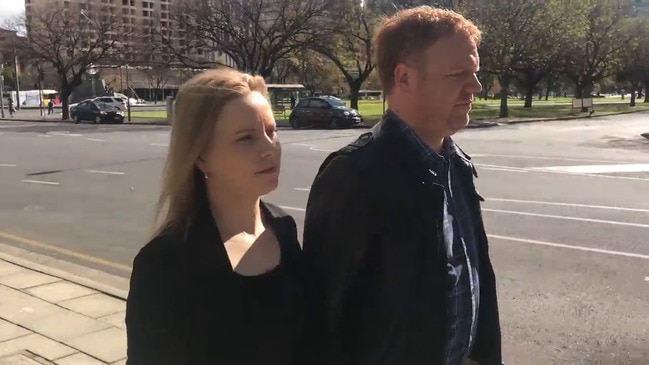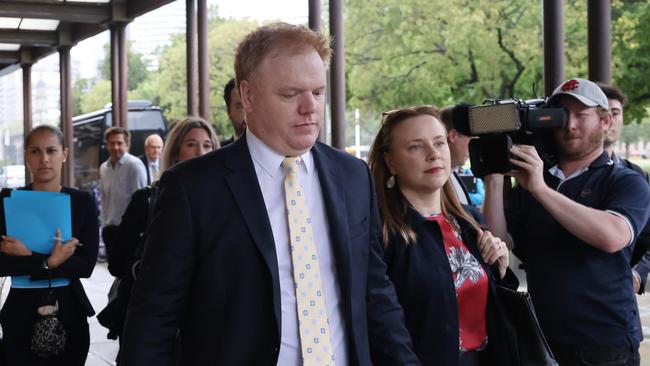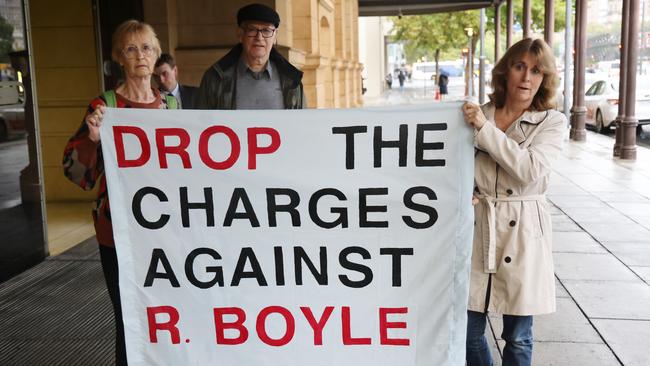Why ATO whistleblower Richard Boyle will face criminal trial
A court has revealed why a whistleblower who revealed intimidation tactics by the tax office will face a criminal trial for speaking out.

The man who blew the whistle on “intimidating” debt collection tactics by the Australian Taxation Office is not protected from criminal action because he failed to disclose crucial evidence at the right time, a court has ruled.
On Monday, South Australian District Court judge Liesl Kudelka told ATO whistleblower Richard Boyle he would be facing a criminal trial in October after dismissing civil action to have criminal charges thrown out.
However, the reasons behind her decision were suppressed until Thursday morning, upon request of commonwealth prosecutors.
The suppression on Judge Kudelka’s judgment reasons was partially lifted in court on Thursday, leaving all but several paragraphs publicly accessible.
Mr Boyle, a former ATO debt collector, had his Edwardstown home raided in April 2018 after expressing concerns about practices in the Australian Taxation Office, and telling ABC’s Four Corners staff in Adelaide had been instructed to “start issuing standard garnishees on every case.”
A garnishee notice is used by the ATO to deduct money from a third party who owes money or is holding money for a debtor, like an employer or super fund, to recover owed money.
Mr Boyle is facing 24 criminal charges, including disclosure of protected information, monitoring private conversations, and recording personal information in relation to the matter, and pleaded not guilty in September 2020.

Section 10 of the Public Interest Disclosure Act 2013 states that an individual who makes a public interest disclosure is “not subject to any civil, criminal or administrative liability (including disciplinary action) for making the public interest disclosure.”
Mr Boyle’s lawyers had argued the lack of protection for whistleblowers while both collecting the evidence and disclosing wrongdoing would discourage others from speaking out in the future, and said Mr Boyle should be covered from prosecution of acts of collecting evidence under the Act.
However, Judge Kudelka found that Mr Boyle was not protected by this section due to the fact he failed to disclose evidence he’d collected at the time he shared his public interest disclosure to an internal recipient within the ATO.
“I find that at some stage while compiling his written public interest disclosure, Mr Boyle made a deliberate decision not to reveal that he was in possession of photographs and audio-recordings,” Judge Kudelka ruled.
“Instead, he chose to make general references to having documentation/evidence to support what he was saying.
“I am of the view that Mr Boyle’s decision to not disclose his possession of photographs and audio-recordings was borne out of his understanding that he had ‘crossed the line’ by engaging in that conduct.”
She further found that section 26 of the PID Act outlines a requirement that to be defined as “an individual who makes a public interest disclosure,” one must disclose information – something Mr Boyle had failed to do by not disclosing the photos and recordings in his possession.
“A person who records information to formulate the public interest disclosure or collects evidence in support of the complaints to be contained therein but has not yet disclosed any information in accordance with the requirements set out in s26(1) (a-c), is not an individual who makes a public interest disclosure,” she ruled.

The judgment came as a blow to many supporters of Australian whistleblowers and advocates for law reform around protection laws.
Human Rights Law Centre lawyer Kieran Pender told NCA NewsWire the judgment reasons blow “a major hole in the protections available to whistleblowers”.
“This judgment is catastrophic for Australian whistleblowers,” Mr Pender said.
“The provision at issue in this case is mirrored in every Australian whistleblowing law, which collectively protect 95 per cent of the Australian workforce, across the private sector and federal, state and territory public sectors.
He said this case would make it harder for Australians to speak up about human rights violations, government wrongdoings and corporate misdeeds.
“By narrowly interpreting the scope of whistleblower protections as applying only to the act of blowing the whistle and not prior preparatory conduct, this judgment dramatically weakens these protections,” he said.
“Richard Boyle did the right thing in exposing wrongdoing at the tax office. He should be protected, not prosecuted.
“This judgment only underscores the need for the Attorney-General Mark Dreyfus KC to drop this case and urgently fix the law. Every day that this case continues compounds injustice for Boyle and further undermines whistleblower protections for all Australians.
“It must end.”
Mr Boyle’s criminal trial is due to start in October this year.

